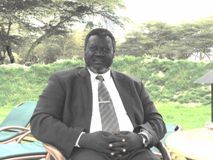Rebel leader: Islam has been manipulated by Sudanese govt
By RAWYA RAGEH, Associated Press Writer
KURMUK, Sudan, Sep 14, 2004 (AP) — A Muslim who fought with the southern rebels accused the government of alienating many Sudanese with its fundamentalist form of Islam.
 “I am a Muslim … but when Islam is being inserted into politics, I am not for it,” Malik Agar, a leader of the Sudan People’s Liberation Movement in the Blue Nile area, said in an interview Monday over a lunch of lamb chops and vegetables.
“I am a Muslim … but when Islam is being inserted into politics, I am not for it,” Malik Agar, a leader of the Sudan People’s Liberation Movement in the Blue Nile area, said in an interview Monday over a lunch of lamb chops and vegetables.
Agar, 55, symbolizes the complexitites of a war often simplified as pitting the Christians of the south against the Muslim north.
The insurgents took up arms in 1983 saying they were fighting for better treatment of the south and for southerners to have the right to choose whether to remain part of Sudan. More than 2 million people have died in fighting and war-induced famine in a conflict fueled by historical disputes and competition for resources, including major oil reserves.
Religion has played a role. Among the most difficult issues before peace negotiators was whether sharia, or Islamic law, should apply in the capital.
In a peace accord that is nearing completion, the two sides have agreed to allow sharia to prevail in Khartoum provided there are guarantees for citizens of Christian and animist faiths.
In this Blue Nile region, on the Ethiopian border some 350 miles (560 kilometers) south of Khartoum, “we are pushing for secularism and a form of coherence, coexistence,” Agar said. “People in this area prefer secularism.”
The Blue Nile is predominantly Muslim, with only two Christian tribes out of 13.
Implementing Sharia means “non-Muslims and other believers are discriminated against,” Agar said, adding that Khartoum’s insistence on Islamic laws alienated other religious groups, shut them out of politics and rendered “them second-class citizens.”
Hard-liners in Khartoum had tried to transform Sudan in the 1990s into their version of an Islamic state. Women were forced to cover up when on the streets, punishments such as chopping off the hands of thieves were instituted, and Islamic extremists from around the world — among them Osama bin Laden, who had a farm just north of here — were welcomed.
The government retreated after the campaign caused tensions with other governments, including that of the United States, and met resistance among many Sudanese.
In 1993 Sudan was added to the U.S. list of countries sponsoring terrorism. U.N. sanctions followed for Sudan’s alleged role in a 1995 attempt by Muslim extremists on the life of Hosni Mubarak, president of neighboring Egypt.
In 1998, after the U.S. embassies in Kenya and Tanzania were bombed, the United States fired cruise missiles at a Sudanese pharmaceutical factory allegedly linked to bin Laden.
Even before the bombing, Sudan had tried to break with militant Muslim groups, expelling the Saudi-born bin Laden in 1996 after its offers to hand him over to Saudi Arabia or the United States were either rejected or ignored. Bin Laden went to Afghanistan.
Agar accused the Sudanese government of “totally damaging the country economically and politically” by embracing fundamentalism.
“People use it (Sharia) for their own gains, not for protecting religion,” Agar said. “They are even doing harm to the religion … by alienating people and portraying Islam as a religion of killing and bloodshed.”
Agar said that even though his rebel group is predominantly Christian, he has never been discriminated against because of his religion in his 21 years as a rebel, first as a foot soldier and now as de facto governor of Blue Nile.
